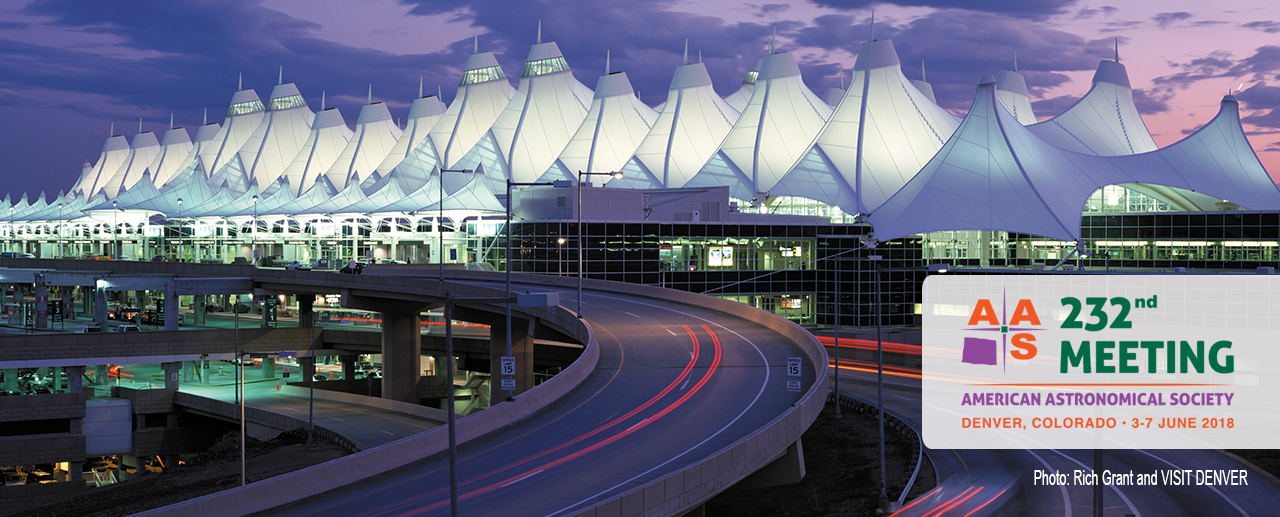Rocky Mountain High: AAS Meets in Denver 3-7 June 2018

Richard Fienberg Running Hare Observatory

Astronomers will get closer to the stars in more ways than one when the AAS convenes its 232nd meeting in the Mile High City from 3 to 7 June 2018 at the Sheraton Denver Downtown Hotel, 1550 Court Place, Denver, CO 80202. The hotel sits in the heart of the city’s financial and business district on a mile-long pedestrian promenade filled with outdoor bistros, shopping, and entertainment. The meeting will attract hundreds of scientists, educators, journalists, and others from around the United States and beyond. If you haven't yet registered or submitted an abstract, note that the regular registration deadline is 26 March, and the late abstract deadline is 19 April. The deadline to make hotel reservations at the AAS group rate is 10 May.
Register for AAS 232 Submit a Late Abstract Book a Hotel Room
The AAS Laboratory Astrophysics Division (LAD) will hold its annual meeting in conjunction with the 232nd AAS meeting. It will feature daily oral and poster sessions on the theme “Bridging Laboratory and Astrophysics,” covering the interplay between laboratory astrophysics and other fields in astronomy, planetary science, and related sciences. David Neufeld (Johns Hopkins University) will give a LAD plenary lecture reviewing results from the European Space Agency’s Herschel Space Observatory and emphasizing the importance of laboratory astrophysics to our evolving understanding of the interstellar medium. The recipients of LAD’s 2018 Laboratory Astrophysics Prize and Dissertation Prize will each give talks in Denver too: Michael Wiescher (University of Notre Dame) and Clayton Myers (Sandia National Laboratories), respectively.
A unique feature of AAS summer meetings is the degree to which members help shape the program by organizing one-off Special Sessions and multisession Meeting-in-a-Meeting (MiM) gatherings. Special Sessions in Denver include “Astrophysics Archives in the 2020s,” “Decadal Survey Preparations: State of the Profession,” and “Indigenous Knowledge in 21st Century Science.” MiMs include “Infrared Astrophysics in the SOFIA Era” (three sessions), “Low Radio Frequency Observations from Space” (three sessions), and “Preparing for JWST Science with the Early Release Science Programs” (four sessions). Evan Kirby (Caltech), recipient of the Society’s 2017 Newton Lacy Pierce Prize for his work on the chemical abundances of stars in dwarf galaxies, has organized a seven-session MiM entitled “Stellar Abundances in Dwarf Galaxies.”
Like Neufeld, Kirby is one of 11 distinguished scientists who will present invited or prize lectures in Denver covering a wide variety of topics. Among the others are Debra Fischer (Yale University), who will kick off the meeting with the Kavli Foundation Plenary Lecture on the state of the art in exoplanet research, and Sarbani Basu (also Yale), who will have her day in the sun as recipient of the AAS Solar Physics Division’s George Ellery Hale Prize for her seminal contributions to our understanding of solar and stellar structure and dynamics. Enrico Ramirez-Ruiz (University of California, Santa Cruz) will present "Heavy-Element Synthesis in the Universe," Alison Coil (University of California, San Diego) will expound upon "The Relationship Between Galaxies and the Large-Scale Structure of the Universe," and Gurtina Besla (University of Arizona) will lecture on "The Dynamics of the Local Group in the Era of Precision Astrometry." Other plenary lectures include Julie Comerford (University of Colorado, Boulder) on "Supermassive Black Hole Fueling and Feedback in Galaxies" and Nicholas Walton (University of Cambridge, UK) on "Gaia: Mapping the Milky Way."
Town Halls enable federal agencies and national observatories to present policy information and solicit feedback from their user communities. Among the organizations convening Town Halls in Denver are NASA, the National Science Foundation, the National Solar Observatory, and the Space Telescope Science Institute. In the wake of last year’s landmark discovery of gravitational waves and electromagnetic radiation from the merger of two neutron stars, there will also be a special Town Hall on the promise of multimessenger astrophysics.
Professional-development opportunities include the following workshops and related activities:
- Using Python to Search NASA's Astrophysics Archives
- Using Anchored Inquiry to Teach Astronomy and Physics
- How to Interactively Teach — and Improve — Students' Quantitative Problem-Solving Skills
- Using Python and Astropy for Astronomical Data Analysis
We know that the financial burden of child and adult dependent care affects our members. The impact can be so great that it often prevents attendance at meetings, especially for early career scientists or those at small institutions with limited funding. The AAS is committed to helping members with dependents attend meetings; therefore, members may apply for subsidized dependent care services during a meeting, for use either at the meeting location or at home.
Apply for a Child/Dependent Care Grant for AAS 232
AAS 232 will be the Society’s first visit to Denver in 14 years; the city has grown and changed dramatically since we held our 204th meeting there in May 2004. Denver has one of the most walkable downtowns in the nation, and a free shuttle bus on the 16th Street Mall makes its many cafes, restaurants, and shops easy to reach. You can stand exactly 5,280 feet above sea level on the steps of the Colorado State Capitol and marvel at the world’s greatest collection of Native American art at the architecturally stunning Denver Art Museum. Beyond the city center you’ll find all sorts of other attractions, including the Buffalo Bill Museum & Grave and the Colorado Railroad Museum. Come for the science, but enjoy the Mile High City too!

